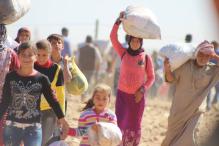Counter-terrorism efforts based on widely-held assumptions about the ideological motivations of children and youth recruited into extremist groups are unlikely to be effective, and could backfire. Evidence from the conflicts in Syria and Iraq, Mali, and Nigeria suggests that even in cases where ideology plays a role in a child’s trajectory towards an armed group, it is usually one of a number of motivating or facilitating factors. Ideology is often intertwined with other important factors like community and identity.
Cradled by Conflict points to other factors present in conflict areas, such as physical safety and food security, family and peer networks, financial incentives, coercion, and the allure of armed groups, which provide a ready-made community, identity, and status for young people.
Cradled by Conflict is the culmination of a two-year research project led by UNU, in collaboration with UNICEF, the Department of Peacekeeping Operations (DPKO), and the Governments of Luxembourg and Switzerland. The initiative aimed to fill key knowledge gaps about child recruitment and use by armed groups in contemporary armed conflicts, including those groups listed as terrorist and characterized as “violent extremist”. The initiative also examined the factors that impede child release from such groups. The goal of this project is to use the empirical findings of the research to inform programmatic guidance for actors in the field working to prevent the recruitment and use of children by contemporary armed groups and to effectively disengage children from such groups.
The research initiative combined extensive outreach and rigorous research methodologies, including extensive consultations with experts and practitioners, a wide-ranging desk review, original field research for three conflict case studies (Syria/Iraq, Mali, and Nigeria), and legal analysis. The project is expected to produce several outputs: three ‘State of Research’ Briefs; an edited volume analysing how and why children become associated with, used by, and exit armed groups in contemporary conflict; and technical guidance, informed by the project’s empirical findings, to assist practitioners in their efforts to design and implement effective prevention and release/reintegration programmes for children.
Download:
-
Cradled By Conflict: Child Involvement with Armed Groups in Contemporary Conflict, edited by Dr Siobhan O'Neil and Kato Van Broeckhoven
-
Viewing Non-State Armed Groups Through a Brand Marketing Lens: A Case Study Of Islamic State, by Amanda Rogers
-
Insights from Social Science on Child Trajectories Into and Out Of Non-State Armed Groups, by Rebecca Littman
-
Insights from Criminology on Child Trajectories Into and Out of Non-State Armed Groups, by Jacqueline Scott
-
Implications for Programming: Technical Note, by Dr Claudia Seymour

